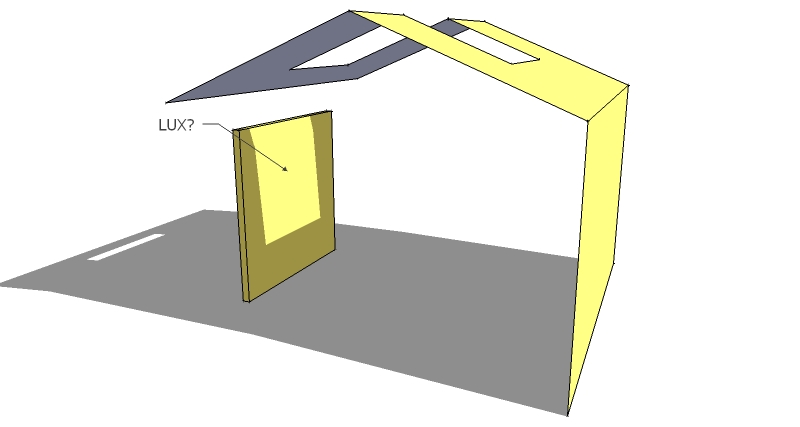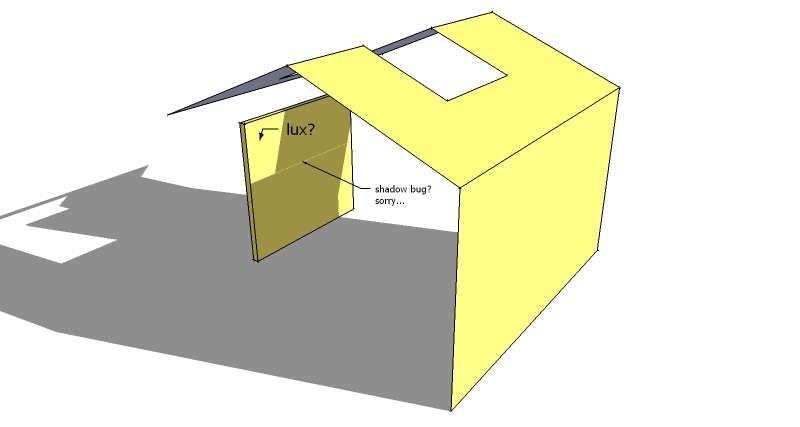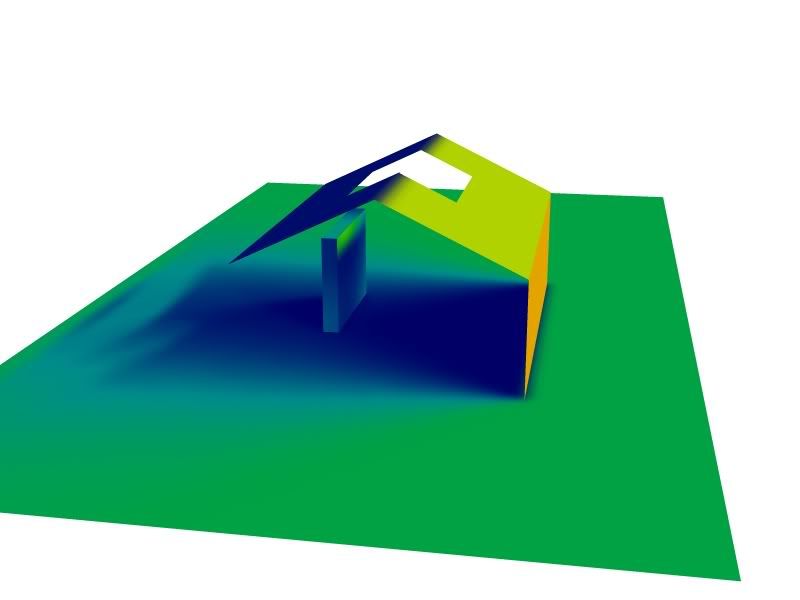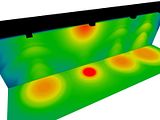Is measuring LUX in a model possible?
-
Thanks Remus and Thomas, I will have a look at the demo.
baz -
@baz said:
Hello all,
Is it possible to get lux information from surfaces in a model with a ruby?
One of my clients builds Greenwalls (vertical gardens), and already finds my shadow studies useful, but if I could tell him how much light is actually hitting his plants it would make his job much easier and it would'nt hurt me either:)
Attached project is not a great example and never got past a feasibility study but it was surrounded by tall buildings and faced south so lux info could have been useful for plant selection. The client is doing quite a few interior installs where lux info is becoming essential.
I have no idea about the math involved in such a ruby, sounds complicated tho.
Too hard?
Baz[attachment=0:8iqmxi44]<!-- ia0 -->mail_general view.jpg<!-- ia0 -->[/attachment:8iqmxi44]LightUp can do realtime spot measurements of lux as remus and thomthom said which is generally used for direct local lighting. LightUp can also full Insolation analysis which might be more what you want. Insolation calculation is based on both the geo-location you've set for the model and the time of year and gives kWh per square meter per day. This mode is useful for determining how effective self shadowing architectural features are working in keeping surfaces cool.
Adam
-
Adam: I'm not finding much info on this on your website - other than the screenshot in the gallery. Am I overlooking something?
-
quote from AdamB "This mode is useful for determining how effective self shadowing architectural features are working in keeping surfaces cool."
I assume that that this works for 'hot' too?
And I have to agree with Thomas, not much info on your website.(And I did sniff around.)
I am a bit wary of of having to learn a whole new app without knowing what I am letting me self in for.And perhaps i have'nt been clear about what I'm after, I would like the actual numbers relating to LUX. Purely in regard to how much light a plant might receive from normal daylight. (Thru a skylight for example.)
Along with the time/date and how much extra light energy it might require to be healthy.If I understand lux at all, it's all about angles (and mathematics, at which I am not at all good at. I am, however, reely good at grammer tho:)
Anyway, it's all good.
baz

-
Yes, LightUp will give you amount of energy falling on the surface as well as a pseudo color image which can help quickly identify problem areas. You can get exact readings using the lightmeter inside LightUp.
It won't give you how much energy you need to make plants healthy.
So with a model like that, based in Boulder, CO on 1st December, the wall gets just 0.11 Kwh/meter/day:

whereas on 24th July, it gets 1.27 Kwh/meter/day:

-
With regards to having to learn a new app, if youve already got a bit of experience in rendering you shouldnt have any problems with lightup.
-
Baz, sorry for being off topic, I just wanted to show you a restaurant chain here in Texas that uses their roof as a garden, a company I previously worked with had a maintenance contract with a few of them.

-
It is really interesting to see Lightup can do this.
I'm not sure how I can use that in my workflow, but it seems a very useful tool. -
This thread is of interest to me. I design museum exhibits where lux / foot candles on the artifacts is very important to the curators. Is it possible to model LUX in an interior model based on the lighting in the exhibit gallery?
If it can, it means I could spec lighting fixtures in the design.

-
@unknownuser said:
This thread is of interest to me. I design museum exhibits where lux / foot candles on the artifacts is very important to the curators. Is it possible to model LUX in an interior model based on the lighting in the exhibit gallery?
If it can, it means I could spec lighting fixtures in the design.

Yes, LightUp can produce Lux contour maps below in which there is a variety of IES light fittings being used:
That red spot has a reading of 780lx, whereas the others are a more reasonable 170-200lx
Adam
-
@adamb said:
Yes, LightUp will give you amount of energy falling on the surface as well as a pseudo color image which can help quickly identify problem areas. You can get exact readings using the lightmeter inside LightUp.
It won't give you how much energy you need to make plants healthy.
So with a model like that, based in Boulder, CO on 1st December, the wall gets just 0.11 Kwh/meter/day:
whereas on 24th July, it gets 1.27 Kwh/meter/day:
Thanks Adam, it's looking interesting, when I mentioned 'light energy' I meant the actual lights which might need to be installed to supplement the existing natural light.
The usual method, as I understand it, of presenting lux info is to spreadsheet it, ie: four columns dividing the year into quarters, each column showing lux for 2/3 times of day. It would be great to be able to present this graphically as you have shown, but you would still need the numbers. Would this be a lot of work in Lightup?
baz -
@remus said:
With regards to having to learn a new app, if youve already got a bit of experience in rendering you shouldnt have any problems with lightup.
Total experience is a couple of months with Twilight after several failed attempts to come to grips with some of the others. (Kerkythea baffled me and I didnt get much past screenshots with the other ones

But the way this thread is going I might have to bite the bullet with lightup.
baz -
@solo said:
Baz, sorry for being off topic, I just wanted to show you a restaurant chain here in Texas that uses their roof as a garden, a company I previously worked with had a maintenance contract with a few of them.
Hi Solo, that looks good.
Fytogreen do roof gardens as well as the vertical variety.
The thing with the Fytogreen system is the use of a water and nutrient retaining sterile foam which weighs very little which means roof structures etc dont have to be engineered for huge loads. Off the top of my head, a sq metre of fully saturated media with plants weighs 40kilos, a significant weight saving over soil.
bazIf you are interested here are the links:
http://www.fytogreen.com.au/Fytowall
http://www.fytogreen.com.au/roof_garden_systems -
Hi,
You can also try Dialux (freeware)
http://www.dial.de
Export your SU models to 3DS and here you go.
Regards, -
@didier bur said:
Hi,
You can also try Dialux (freeware)
http://www.dial.de
Export your SU models to 3DS and here you go.
Regards,Thanks for the link Didier, I will have a look.
baz -
Hi,
I have a question about IES Lights. On the Internet there are many catalogs with IES Lights. Is there a possibility to use it in Sketchup and Kerkythea? I've only used the KT-Lights in the plugin folder.
Karlheinz
-
Moved the thread to the Developer's forum. We have reorganized so that the Plugin section is only a list of plugins you can download and use.

-
I am quite impressed seeing how lightup have improve since the first time I use it...
I guess I should try it again, but metropolis render give me very good results in Kerkythea and podium.
Adam, is it possible to extract some insulation numerical values (eg : on a desk) after the calculation ? I would like to use it in a lighting optimization script.
-
@minguinhirigue said:
Adam, is it possible to extract some insulation numerical values (eg : on a desk) after the calculation ? I would like to use it in a lighting optimization script.
Yes, in that you can call the LightUp functions from Ruby to generate "spot" results at locations you choose. (
view.spotlux(x,y)) but really we should have a proper report generating framework.What kind of information / format are you looking for?
Adam
-
Just downloaded LightUp , question about Lux.
Does the default extinction(0.5) give proper insolation values for daily sunlight output?
Advertisement








